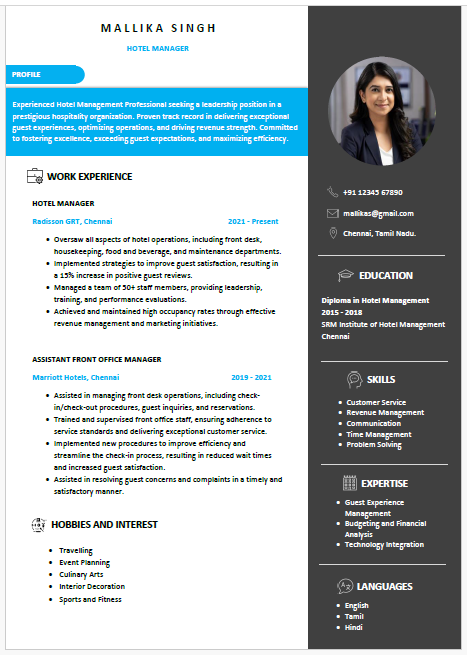Hotel Manager
Diploma in Hotel Management

About this template
This is a very colorful and modern resume which can help you stand out from the competition.
Its vibrant design and well-organized layout effectively showcase your skills and achievements, making a lasting impression on potential employers.
Some important and useful soft skills for Hotel Manager
A Hotel Manager needs a diverse set of soft skills to effectively oversee operations, ensure guest satisfaction, and lead staff. Here are ten important and useful soft skills for this role:
1. Communication Skills:
Effective communication is crucial for a Hotel Manager to interact with guests, staff, and other stakeholders. Clear and courteous communication helps in resolving issues, giving instructions, and ensuring smooth operations within the hotel.
2. Leadership:
Strong leadership skills enable Hotel Managers to inspire and motivate their teams. This involves setting a positive example, providing direction, and fostering a collaborative work environment that encourages staff to deliver exceptional service.
3. Customer Service Orientation:
A keen focus on customer service is essential for ensuring guest satisfaction. Hotel Managers must understand and anticipate guest needs, address complaints efficiently, and strive to enhance the overall guest experience.
4. Problem-Solving:
The ability to quickly and effectively solve problems is vital in the hospitality industry. Whether dealing with guest issues, operational challenges, or unexpected situations, a Hotel Manager must be resourceful and decisive in finding solutions.
5. Time Management:
Managing a hotel involves juggling multiple responsibilities, from overseeing daily operations to planning events. Good time management skills help Hotel Managers prioritize tasks, delegate responsibilities, and ensure that all aspects of the hotel run smoothly.
6. Attention to Detail:
Attention to detail is crucial in maintaining high standards of cleanliness, service, and overall hotel presentation. This skill ensures that all aspects of the guest experience, from room setup to amenities, meet the hotel's quality standards.
7. Financial Acumen:
Understanding and managing the hotel's finances is an important skill. Hotel Managers must be able to create budgets, monitor expenses, and analyze financial reports to ensure profitability while maintaining service quality.
8. Adaptability:
The hospitality industry is dynamic, and a Hotel Manager must be adaptable to changing circumstances. This includes responding to seasonal variations in business, adapting to new technologies, and staying updated with industry trends.
9. Conflict Resolution:
Conflict resolution skills are essential for handling disputes among staff or with guests. A Hotel Manager must be able to mediate conflicts, find fair solutions, and maintain a positive atmosphere in the hotel.
10. Empathy:
Empathy helps Hotel Managers understand and relate to the emotions and perspectives of both guests and staff. This skill is crucial for creating a welcoming environment, addressing concerns with sensitivity, and fostering a supportive workplace culture.
Conclusion:
These soft skills are fundamental for a Hotel Manager to successfully manage daily operations, lead teams, and ensure a memorable experience for guests, contributing to the hotel's reputation and success.